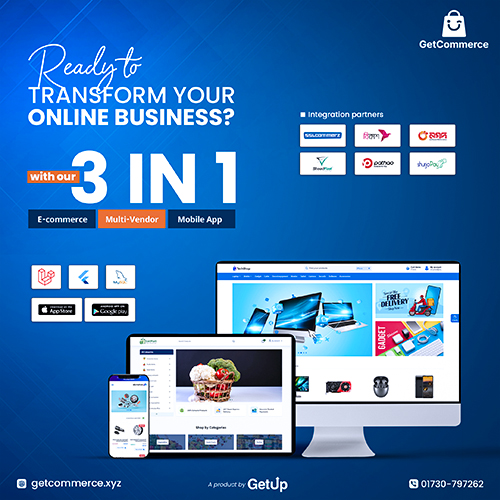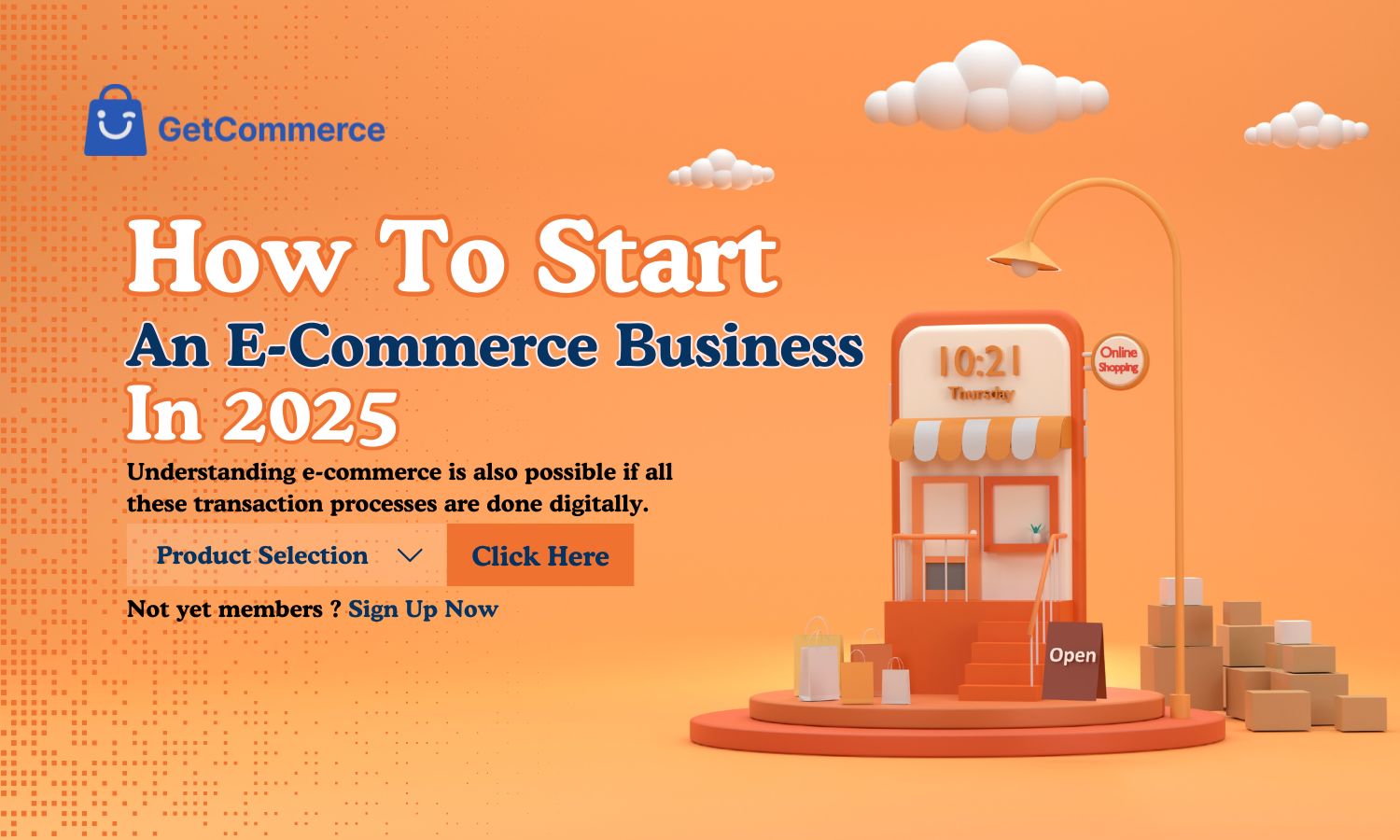E-commerce is revolutionizing the way small businesses operate in Bangladesh. With platforms like Daraz, AjkerDeal, and Bikroy driving the online shopping boom, small and medium enterprises (SMEs) have unprecedented access to a nationwide audience. This shift isn't just about selling products online; it's about unlocking growth opportunities, improving customer reach, and streamlining business operations.
In this article, we'll explore the benefits of e-commerce for SMEs, uncovering how online platforms empower Bangladeshi small businesses to thrive in a competitive market. From increasing visibility to optimizing logistics, discover why embracing e-commerce is necessary for your business's success in today's digital-first world.
Major Benefits of E-Commerce for Small Businesses
E-commerce has revolutionized the way small businesses operate globally, including in Bangladesh. For local small and medium-sized enterprises (SMEs), embracing an online business model presents numerous opportunities to expand market reach, lower overhead costs, and optimize operations. This shift provides businesses with scalable, cost-effective tools that are key to staying competitive in an increasingly digital economy.
Here are the major benefits of e-commerce for small businesses in Bangladesh:
2.1 Expanding Market Reach
E-commerce allows small businesses in Bangladesh to break free from the limitations of physical storefronts. By going online, businesses can tap into both local and international markets, significantly expanding their reach.
- Wider customer base: Through platforms like Daraz, AjkerDeal, and Bikroy, small businesses can target customers beyond Dhaka, reaching underserved areas across the country.
- Global exposure: E-commerce bridges the geographical divide, allowing businesses to showcase their products internationally without the constraints of physical location. This is particularly valuable for Bangladeshi SMEs seeking to export locally made products.
- Enhanced visibility: With SEO optimization and social media integration, businesses can attract customers organically, ensuring that even niche products find their target audience.
The convenience of online shopping also appeals to modern consumers, who prefer the flexibility of shopping at any time, regardless of location.
2.2 Reducing Overhead Costs
One of the most attractive benefits of e-commerce is the ability to reduce operational costs significantly. For small businesses in Bangladesh, starting an online store is far more affordable than maintaining a physical shop.
- No need for a physical store: E-commerce eliminates the need for renting and maintaining a brick-and-mortar store, allowing businesses to save on overhead costs like rent, utilities, and maintenance.
- Affordable setup: Platforms like Shopify, WordPress, and Wix offer cost-effective ways to build and run an online store. With minimal upfront costs and ongoing expenses, e-commerce presents a viable option for entrepreneurs with limited budgets.
- Cost-effective marketing: Traditional advertising can be expensive, but e-commerce allows businesses to leverage digital marketing tools—such as social media marketing, SEO, and email campaigns—to reach a broader audience at a fraction of the cost.
This low-cost model enables small businesses to reallocate resources toward growth, product development, and customer service.
2.3 Better Inventory Management and Customer Insights
Managing inventory efficiently and gaining insights into customer behavior are key to optimizing business operations. E-commerce platforms offer robust tools for tracking inventory and analyzing sales data, making it easier for small businesses in Bangladesh to make data-driven decisions.
- Real-time inventory tracking: E-commerce platforms such as Zoho Inventory, QuickBooks, and TradeGecko enable businesses to monitor stock levels and prevent overstocking or understocking. This ensures a smooth customer experience and reduces the risk of losing sales.
- Customer behavior analysis: E-commerce platforms also provide valuable customer insights, including purchasing patterns, product preferences, and browsing habits. With tools like Google Analytics and built-in platform analytics, businesses can optimize their product listings, sales strategies, and marketing efforts.
- Improved efficiency: Automated inventory management and data analytics reduce the time spent on manual tasks, improving operational efficiency and freeing up time to focus on customer satisfaction and product innovation.
With these insights, businesses can tailor their offerings to meet customer demand and increase sales.
2.4 Flexible Payment Options for Customers
One of the significant barriers to online shopping in Bangladesh has been the lack of convenient payment options. However, with the rise of digital payment systems, small businesses can now offer customers a range of secure payment methods, making transactions easier and more trustworthy.
- Mobile payment solutions: Integrating popular payment systems like bKash, Rocket, and Nagad allows customers to pay through mobile wallets, a preferred method in Bangladesh.
- Flexible payment gateways: E-commerce platforms often provide multiple payment options, including credit/debit cards, bank transfers, and even cash-on-delivery, which helps cater to different customer preferences.
- Secure transactions: Offering reliable and secure payment methods builds trust with customers, encouraging repeat business and boosting conversion rates.
Incorporating these digital payment solutions not only simplifies the buying process but also enhances customer satisfaction and loyalty, driving higher sales and improved cash flow.
By adopting e-commerce, small businesses in Bangladesh can enjoy broader market access, reduced operational costs, better inventory control, and improved customer engagement. This digital shift is no longer a luxury but a necessary strategy for growth in today’s competitive business environment.
Overcoming Common Challenges of E-Commerce Adoption
E-commerce can be a significant growth opportunity for small businesses in Bangladesh, but challenges like limited digital skills and logistics hurdles are common barriers. To succeed in the growing small business market, it's essential for SMEs to overcome these e-commerce challenges. Practical solutions, such as digital literacy training and partnering with local delivery services, can help ease these difficulties and allow businesses to thrive in the online marketplace. By addressing these obstacles, small businesses can tap into new markets and reach customers beyond Dhaka, making selling online in Bangladesh a viable and rewarding option.
|
Challenge |
Explanation |
Practical Solutions |
|
Limited Digital Literacy |
Many small businesses in Bangladesh struggle with using e-commerce tools, payment systems, and inventory software. This lack of digital literacy affects their ability to implement effective e-commerce strategies. |
- Offer digital literacy training for business owners and employees to build skills in handling online platforms. - Use affordable e-commerce platforms like Shopify or WordPress that provide user-friendly interfaces. |
|
Logistics and Delivery Issues |
Inadequate logistics infrastructure, particularly outside Dhaka, often delays deliveries and leads to customer dissatisfaction. E-commerce challenges for SMEs include unreliable delivery services. |
- Partner with local delivery services such as Pathao, Handy Delivery, or Sundarban Courier for improved logistics solutions. - Use integrated delivery platforms that connect businesses with local delivery services. |
|
Payment System Integration |
SMEs may face difficulties in integrating secure and efficient e-commerce payment systems. Lack of secure payment gateways can deter customers from making purchases. |
- Implement mobile payment solutions like bKash, Rocket, and Nagad which are widely trusted and used in Bangladesh. - Offer COD (Cash on Delivery) alongside digital payments to cater to a broader audience. |
|
Building Customer Trust |
Trust and customer confidence are vital in online shopping. Bangladeshi customers may hesitate to purchase from unfamiliar online stores due to concerns about product quality or payment security. |
- Include customer reviews and testimonials to establish credibility. - Offer a clear return policy and engage customers through social media channels like Facebook to build trust. |
This table addresses the barriers to e-commerce success that many Bangladeshi SMEs face while also providing practical solutions that can help overcome these challenges. The key focus is selling online in Bangladesh, providing cost-effective e-commerce solutions, and utilizing local payment and delivery options to ensure businesses can scale successfully in the growing small business market.
Practical Steps for Starting an E-Commerce Website in Bangladesh
Setting up an e-commerce website in Bangladesh is a structured process that requires careful planning and the right tools. By following these simple steps, you can start your online business and ensure it thrives in the competitive market. Here's how you can get started:
Step 1: Choose the Right E-Commerce Platform
Selecting a reliable e-commerce site developer is the first crucial step in setting up your online business. Platforms like GetCommerce are perfect for small businesses as they provide easy-to-use tools to create a professional-looking website. These platforms often offer customizable templates and integration features, making it easier for you to set up an online store with minimal effort. E-commerce solutions for SMEs can be cost-effective and user-friendly, enabling even beginners to start selling quickly.
Step 2: Set Up Payment Systems
For a smooth transaction process, it's essential to set up secure and convenient payment systems. In Bangladesh, you can integrate local payment options such as bKash, Nagad, and Rocket, which are widely used by consumers. These local payment gateways provide easy and secure transactions for your customers, offering them the flexibility they need. Additionally, you can also offer bank transfers and credit card payments to reach a broader customer base. Implementing these payment solutions ensures that your customers have a seamless and trustworthy experience.
Step 3: Develop a Marketing Strategy
Once your website is live, it’s time to attract customers. Marketing through social media is one of the most effective ways to engage with Bangladeshi customers. Platforms like Facebook, Instagram, and TikTok are popular for digital ads and organic promotions. Running targeted ads can help you reach a wider audience. Additionally, creating engaging content that resonates with your target market can boost your e-commerce growth in Bangladesh. Don't forget to include discounts and promotions to encourage first-time buyers.
Step 4: Optimize for Mobile Users
In Bangladesh, a significant number of consumers use mobile devices to shop online. Therefore, it's crucial to have a mobile-friendly website. Ensure that your e-commerce platform is responsive and loads quickly on smartphones. A well-optimized mobile site increases your chances of converting visitors into paying customers, leading to better sales and customer satisfaction.
Step 5: Set Up a Reliable Delivery System
Logistics is a key challenge for e-commerce businesses in Bangladesh. Partnering with reliable local delivery services like Pathao, Paperfly, or RedX can help streamline your order fulfillment process. Offering flexible delivery options and timely shipments will enhance customer satisfaction and encourage repeat purchases. Efficient logistics solutions help your e-commerce business stand out in the competitive marketplace.
By following these steps for setting up an online business in Bangladesh, you'll be well on your way to building a successful e-commerce store. With the right platform, payment systems, marketing strategy, mobile optimization, and delivery partnerships, you can set a strong foundation for your online business.
Conclusion
E-commerce offers significant benefits for small businesses in Bangladesh, from expanding market reach to reducing operational costs and improving efficiency. With the right e-commerce platform, small businesses can tap into local and global markets, cut overheads, and streamline their processes, leading to increased sales and growth. By embracing digital payment systems and smart inventory management, SMEs can operate more smoothly and serve customers better. Exploring e-commerce provides immense opportunities for small businesses to thrive and scale.
Ready to take your business online? Start your e-commerce journey today with GetCommerce and unlock the potential for growth and success!
FAQs
1. How can small businesses start selling online in Bangladesh?Start by choosing an easy-to-use e-commerce platform like GetCommerce, set up local payment systems (bKash, Bank Transfer), and market through social media to attract Bangladeshi customers.
2. What are the best e-commerce platforms for Bangladeshi SMEs?GetCommerce is ideal for small businesses in Bangladesh, offering simple setups and affordable plans. Shopify and WooCommerce are also popular options for flexibility.
3. Is e-commerce affordable for small businesses in Bangladesh?Yes, e-commerce is cost-effective. GetCommerce provides affordable pricing, and digital marketing through social media ads keeps costs low while boosting sales.
4. How does e-commerce help small businesses manage inventory?E-commerce platforms automate inventory tracking, ensuring you never run out of stock and reducing manual errors.
5. What payment systems can be used for e-commerce in Bangladesh?Use local payment solutions like bKash, Nagad, or Rocket for secure and easy transactions.






